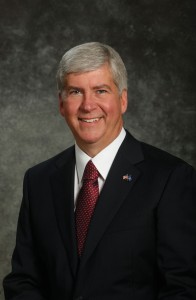
Gary Wilson.
Commentary
By Gary Wilson
These are tough times for Michigan Gov. Rick Snyder.
Instead of working on his second-term plan to continue the revitalization of Michigan’s economy and image, he’s managing a crisis of his own making: Flint’s drinking water disaster.
A year ago his name was floated as a presidential candidate.
Now he’s had to testify before Congress under oath on how Flint happened and what he knew. Facing multiple lawsuits, meetings with lawyers likely dot his calendar.
And it’s only beginning.
The magnitude of the work that needs to be done on Flint will consume and overshadow the balance of his term. Instead of riding out of office in 2018 with a list of accomplishments, the best he can hope for is to save his job by saving Flint.
He can hope that like deposed President Richard Nixon’s big accomplishment — opening the door to China — history will look at his record beyond  Flint and see that he gave Detroit a chance to survive and perhaps experience a renaissance.
Flint and see that he gave Detroit a chance to survive and perhaps experience a renaissance.
And he got a redemption lifeline from an expected source last week.
Testifying before Congress on Flint, he was paired with U.S. EPA Administrator Gina McCarthy. They’re at the top of the tree of executives responsible for Flint.
McCarthy had three prongs to her testimony; blame Michigan, deny any EPA responsibility and repeat. She said EPA was “strong-armed and misled” by Michigan and “we couldn’t do our jobs effectively.”
Not so says Marc Edwards, the Virginia Tech professor who helped expose the crisis in Flint.
The EPA “aided, abetted and emboldened” Michigan’s Department of Environmental Quality and “had everything to do with creating Flint,” Edwards has said.

EPA Administrator Gina McCarthy
McCarthy’s testimony set the bar low. Then she tripped over it.
She reminded me of the Happy Days TV character Fonzie, who could never admit wrong or say he was sorry, even when faced with indisputable facts. And at one point in the hearing she lost her poise and professional demeanor when she gazed away from the questioner in mocking disgust.
By contrast, Snyder did well in the hearings where political attacks are rampant and the best outcome is to survive with minimal damage.
He was well-prepared, kept an executive demeanor and didn’t take the bait under relentless pressure from attacking Democrats.
You can question whether he’s fully disclosed details about his involvement and I still do. You can wonder if his apology for Flint is sincere; I accept that it is. But he made the effort, believe him or not.
And unlike McCarthy, he was contrite and accepted responsibility.
The politically charged hearings on Flint didn’t unearth anything new and didn’t change minds. The Snyder critics and haters — they’re legion — still don’t accept his contrition or believe him.
And even those who know the EPA bears significant responsibility for Flint, probably held their nose and looked the other way at McCarthy’s repeated spin of an indefensible message.
The worst of political theater is hopefully over and Snyder is still standing.
The governor has a plan to make drinking water quality in Flint and Michigan a top priority. He wants Michigan to exceed federal standards and lead the nation. That’s a tall order.
But plans are cheap; it’s the result that counts and that’s how Snyder will be measured.
His defense on Flint focused blame on the MDEQ and he’s pledged to revamp that

Michigan Gov. Rick Snyder
agency’s culture and mission. That could be tough.
It will take more than reconfiguring the boxes on the org. chart. Bureaucratic cultures are entrenched and risk-taking isn’t rewarded. Governors and agency heads change with the political winds every few years while bureaucrats remain.
Snyder personally has to believe in what he is doing.
He’ll have to make hard decisions that go against his type on the Enbridge Straits of Mackinac pipeline. Snyder will have to get tough with a key constituency — agriculture — to protect Lake Erie. To date he’s been soft on both issues exhibiting the type of involvement that led to Flint.
If he does those things, MDEQ can begin to change and the first small steps toward restoring the public’s trust in the crippled agency will have been made. If not, the status quo that enabled Flint will remain waiting for the next disaster.
“Ineffective U.S. EPA”
What about the USEPA’s Great Lakes region? The one that has presided over drinking water crises in Toledo and Flint.
It has failed in its role of protecting water quality and the people who depend on it.
The EPA’s bungling and intransigence in dealing with Lake Erie’s algae problems recently prompted Sandy Bihn to tell the Toledo Blade “I think one of the problems is we have a very ineffective U.S. EPA [Region 5, based in Chicago].”
That’s an understatement by the long-time Lake Erie activist. “Ineffective” assumes a reasonable effort is being made. Negligent is more appropriate.
Sadly, after McCarthy’s pitiful testimony in the Congressional hearings, there are no signs that she and EPA see their problem. And incredibly, the White House released a statement praising McCarthy saying the EPA “never had a better administrator.”
The administrator whose top lieutenant, Susan Hedman, lacked the courage and decency to tell the citizens of Flint that their drinking water was lead-poisoned.
Washington politics took precedent over the citizens of Flint.
No wonder Snyder looks credible in comparison.
Flint whistle blower email illustrates U.S. EPA’s blame and deny strategy on Flint.
http://www.detroitnews.com/story/news/michigan/flint-water-crisis/2016/03/28/whistle-blower-del-toral-grew-tired-epa-cesspool/82365470/
Gary Wilson
The fact that the state’s unemployment rate is below national average is now lost in the shuffle. The EPA showed how to cheat on the tests and told the water dept. to hold off on the corrosion treatment.